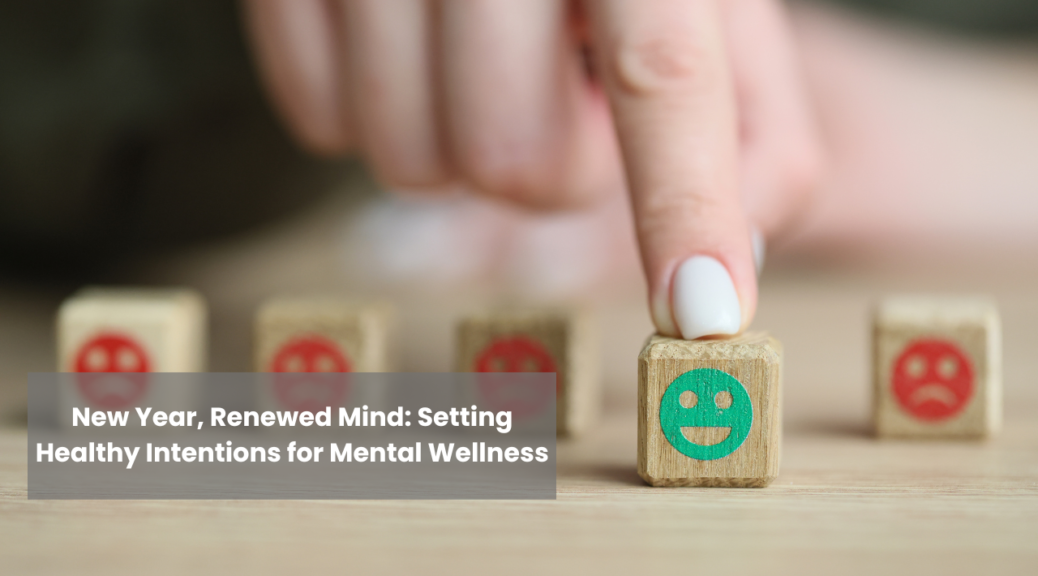As the countdown to the New Year begins, it’s not just about making resolutions that fade away by February; it’s about cultivating a mindset that fosters lasting well-being. In the hustle and bustle of Northern Virginia, where life moves at a rapid pace, taking a moment to set mental health intentions for the upcoming year can be a transformative practice. This blog post aims to explore the significance of intentional mental health planning and offers guidance on creating a roadmap for a healthier, happier mind in the coming year.
The Significance of Mental Health Intentions
Let’s explore the profound impact of intentionally shaping mental and emotional well-being in the following subheadings:
The Importance of Mental Health Intentions
In a world where physical fitness often takes the spotlight, the importance of mental well-being should not be overlooked. Setting mental health intentions involves proactively shaping the state of your mind and emotions, paving the way for a more fulfilling and balanced life. Northern Virginians, amidst their busy lives, can benefit greatly from this intentional approach to mental wellness.
Reflecting on Mental Well-Being
Before diving into goal-setting, it’s crucial to reflect on your current mental state. Take a moment to assess stressors, identify triggers, and acknowledge areas that may need attention. Northern Virginia’s fast-paced lifestyle can sometimes lead to neglecting our mental health. This reflection sets the foundation for meaningful intentions tailored to individual needs.
Goal-Setting for Mental Well-Being
Here’s how you can foster mental well-being through goal-setting:
Setting Achievable Goals
Rather than vague resolutions, focus on specific, achievable goals that contribute to mental well-being. Whether it’s incorporating mindfulness practices, dedicating time for self-care, or fostering positive relationships, the key is to make goals realistic and sustainable. For example, scheduling regular therapy sessions can be a tangible step towards maintaining mental health.
Incorporating Therapy Sessions
Therapy is a valuable tool for navigating life’s challenges. Northern Virginians should consider including therapy sessions in their mental health plan. Professional support provides a safe space to explore emotions, develop coping mechanisms, and gain valuable insights. Whether facing work-related stress or personal struggles, therapy can be a transformative and proactive step towards mental wellness.
Mindfulness Practices for Daily Life
In the midst of hectic schedules, integrating mindfulness practices can create a sense of calm and clarity. From simple breathing exercises to mindful walks, Northern Virginians can find moments of stillness amid the chaos. These practices not only reduce stress but also enhance overall mental resilience.
Prioritizing Positive Habits
Cultivating positive habits contributes significantly to mental health. Whether it’s maintaining a regular sleep schedule, staying physically active, or fostering hobbies, these habits play a vital role in sustaining a positive mindset. Northern Virginians can create a routine that prioritizes self-care, building a foundation for long-term mental well-being.
As the New Year approaches, let it be a reminder to prioritize your mental health. Setting mental health intentions is not just a trend; it’s a commitment to your well-being. In Northern Virginia, where the pace of life can be demanding, taking intentional steps towards mental wellness is a gift to yourself. Reflect, set achievable goals, incorporate therapy sessions, embrace mindfulness, and prioritize positive habits. May the coming year bring not only new opportunities but also a renewed and resilient mind.
How CCHC Can Help
The Center for Connection, Healing, and Change takes an interdisciplinary approach, interweaving psychotherapy and neuroscience with the timeless wisdom of mindfulness and meditation.
We promote connection, healing, and change in the following areas: couple and family relationships, substance use and processing addictions, depression and/or anxiety, self-worth and identity, sexual life, baby bonding and communication, attachment, experiences of trauma, abuse, and PTSD, childhood experiences and family of origin work, chronic pain and physical illness, military life, parenting, stress management and resilience building, emotional regulation and wellbeing, anger management, spiritual life, behavioral issues, and sexuality.
Our therapists work with couples, children, teens, families, and adults—all from a systemic and holistic perspective.
We are particularly committed to providing services grounded in trauma-informed care, somatic and body-based approaches, and attachment-focused ways of working.
Schedule a free consultation with us today, or visit our offices in Woodbridge or Fairfax.




